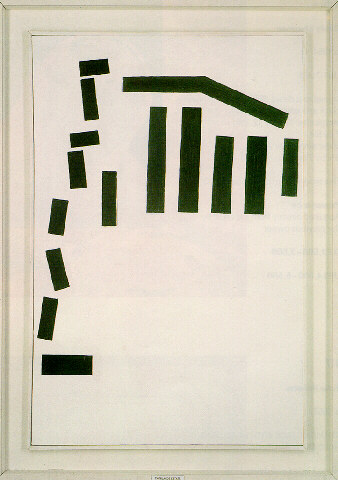



One of the innumerable little ideas that we've idly dreamt up, entertained for about five minutes and then discarded, through a mixture of satisfaction at the concept itself and the usual 'it's not worth it' attitude to production and dissemination (or, of course laziness), was a series of paintings based on the billboards at the entrance to post-war housing estates, and the strangely suprematist maps they have displayed on them. A strange movement of sign, whereby pictorial function invites aesthetic comparison with avant-gardism, connected by a strange Utopian quotidian.
It's interesting, for we have never, ever seen a map for a suburban 'garden city' style estate. Is this indicative of something? Quasi-vernacular estates are certainly no less visually homogenous nor labyrinthine than their Modern relatives, in fact, they are often more so. In a naive vein; why would a municipal authority charged with providing housing for society also provide a service such as a visual guide to those visiting, and why would a speculative house-builder not? Could even an object as simple as a map be prone to ideological coding, infused with notions of individualism and collective space? Or maybe it's just the relation to the street, the coding of mass housing in named blocks (oh, and what names they have!) as opposed to houses off a street, numbered according to a universal system.
Well, luckily for the populace, Keith Coventry has been painting these for a while now. We've just missed an exhibition of his, but I'm not sure there's much to find on the canvases themselves that isn't graspable in a jpeg, in fact, just conceptualising the paintings may well have been enough.

5 comments:
All very Malevich. Which reminds of Kenneth Frampton's (plausible) claim that the plans of Mies' villas and flats in 1920s Berlin were indebted to Malevich and suprematism (also Mies' later partner Hilberseimer translated and introduced Malevich to the English-speaking world in the 50s) so this all seems to be the whole thing going full circle...
Cf this, also.
indeed - William J R Curtis makes much the same point, to the extent that the cover of my copy of Modern Architecture Since 1900 is graced by the plan of one of Mies' brick villas...
http://www.pitt.edu/~tokerism/0040/0371BrickVilla.jpg
I'm wary of the Malevich-'Name Architects' link though, for obvious Z.H. related reasons.
Have you seen this?-
http://www.euklides.no/img_displayer.php?img=/img/gen/0b426d36adbb59378ffc187586c71222.jpg
Yes, of course, as a Zaha apologist - I saw it at the Design Museum show. I prefer ZH in harsh and angular mode rather than the flowing, organic parametric wibble mode, of course.
Someone (I can't remember the architect off top of head) was slotted to design in Moscow a series of 'avangard' buildings, based on painters of the 10s-20s - there was going to be a Kandinsky one, a Malevich and a Rodchenko, as I recall. Is worth a whole Jameson essay that such a thing would be planned while the buildings by the actual 1920s avant-garde (Melnikov, Vesnins, Golosov etc) are rotting to pieces...
Ew, a few too many 'of courses' in that comment...
there's a hideous new 'Mondrian' estate in Glasgow, which doesn't even stick to the correct colours.
Reminds me of the 'Hirst' building we saw.
In fact, what's the most inappropriate artist to base a building on?
My opening gambit would be the 'Nitzsch' apartments...
Post a Comment